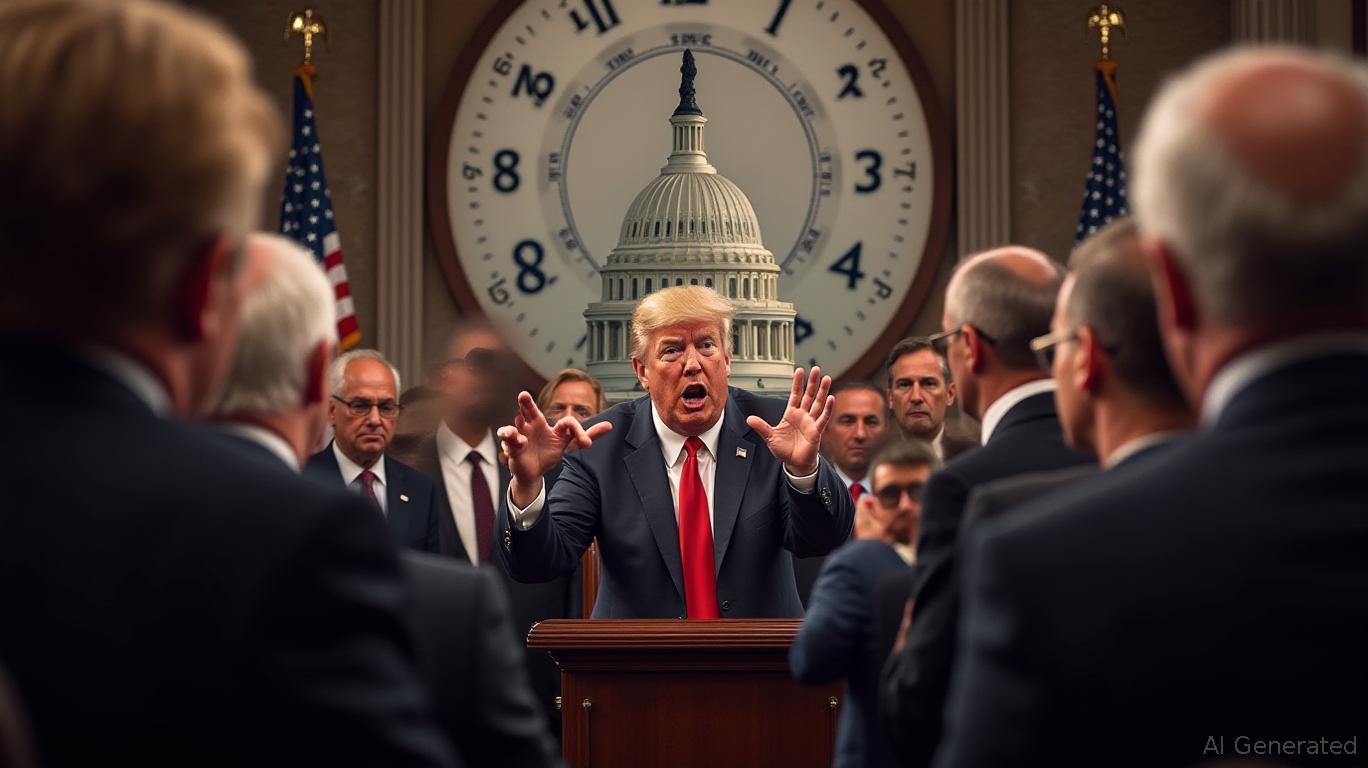Partisan Dispute on Healthcare Subsidies Leaves Government Stalled in 35-Day Shutdown
- U.S. government shutdown hits 35 days, matching 2018-2019 record due to partisan disputes over healthcare subsidies and funding. - Democrats demand ACA premium subsidy extension, while Republicans oppose tying funding to pandemic-era programs, causing unpaid workers and service disruptions. - Economic risks grow with potential $1.4B losses if shutdown extends, as military pay and food assistance programs face critical strain. - Senate shifts toward seeking 2026 funding extension after failed short-term b
On November 4, 2025, the U.S. government shutdown reached its 35th day, equaling the longest in American history, as the standoff between Democrats and Republicans shows no sign of resolution. The impasse, rooted in disputes over federal funding and the continuation of pandemic-era healthcare subsidies, has resulted in hundreds of thousands of federal employees missing paychecks and has interrupted essential government services. As the Senate prepares for a 14th vote on a temporary funding measure supported by Republicans, both parties remain firmly opposed, raising concerns about economic consequences and increasing public dissatisfaction.
This shutdown echoes the 35-day closure of 2018-2019, which was sparked by a disagreement over then-President Donald Trump’s request for $5.7 billion to build a border wall. The current deadlock arises from Democrats’ insistence on extending Affordable Care Act (ACA) premium subsidies, set to expire at the end of December, before agreeing to any funding bill. Senate Majority Leader John Thune, R-S.D., admitted that the November 21 deadline in the House-approved bill is no longer realistic, indicating a move toward a more extended funding plan. “That date is off the table,” Thune remarked, expressing willingness to consider funding the government into early 2026, as reported by an

The financial impact continues to grow. The Congressional Budget Office projected that a shutdown lasting four weeks could cut fourth-quarter GDP growth by one to two percentage points, with losses potentially reaching $1.4 billion if the closure extends to eight weeks, according to
Senate Minority Leader Chuck Schumer, D-N.Y., and other Democrats have characterized the standoff as a matter of ethics. “Americans are facing a healthcare crisis unlike anything we’ve seen before,” Schumer stated, accusing Republicans of putting political interests ahead of the public good. Republicans, on the other hand, claim that linking funding to ACA subsidies is a bargaining tactic. “The casualties of the Democrats’ shutdown are mounting,” Thune commented, calling for an end to what he described as “irresponsible” Democratic obstruction, according to
Past shutdowns, such as the 21-day closure in 1995-1996 and the 16-day shutdown in 2013, illustrate the growing frequency of these crises in a deeply divided Washington. The current impasse has already outlasted the 1995-1996 shutdown and now matches the 2018-2019 record. With the Veterans Day break approaching and the political landscape shifting ahead of mid-term elections, pressure on lawmakers is intensifying. Still, with no agreement in sight, the ongoing shutdown underscores the difficulties of governing amid increasing polarization, as highlighted by
Disclaimer: The content of this article solely reflects the author's opinion and does not represent the platform in any capacity. This article is not intended to serve as a reference for making investment decisions.
You may also like
Ethereum Updates Today: The Latest Crypto Competition: BullZilla's Meme Frenzy Puts Ethereum's Reputation to the Test as Solana Advances
- BullZilla ($BZIL) surges 2,381% in October 2025, outperforming Ethereum and Solana amid crypto market realignment. - Ethereum drops 2.45% as ETF outflows and rising Treasury yields pressure its short-term price despite strong DeFi infrastructure. - Solana gains momentum with $200M ETF inflows and developer growth, challenging Ethereum's Layer 1 dominance through superior scalability. - BullZilla's presale model, 24-stage burn mechanism, and projected 2,381% ROI attract 3,300 holders amid Q4 volatility an

Ethereum Updates: HyperUnit's $55 Million Crypto Wagers Withstand $1.1 Billion Liquidation Surge
- Ethereum fell below $3,400 on Nov 4, 2025, marking its first annual negative performance since 2025, while Bitcoin neared $100,000 support. - A $110M Balancer hack and Fed Chair Powell's hawkish comments triggered $1.1B in crypto liquidations, wiping out 303,000 traders' positions. - Whale HyperUnit defied the selloff by buying $37M Bitcoin and $18M Ethereum, contrasting with the Crypto Fear & Greed Index hitting 21. - Analysts debate Ethereum's $3,000 support and Bitcoin's $106,600 level, with market st

The United States Cracks Down on North Korea's Cryptocurrency Assets Supporting Nuclear Arms Development
- U.S. Treasury sanctions 8 North Korean individuals/entities for laundering $2B+ in stolen crypto to fund nuclear programs. - Targets include state bankers, IT firms, and banks using mixers/shell companies to evade sanctions via China/Russia intermediaries. - Cyber-enabled theft by North Korea reached $3B in 3 years, exploiting AI hacking tools and social engineering attacks on crypto exchanges. - Sanctions aim to disrupt DPRK's ability to convert stolen crypto into hard currency, a critical lifeline for

As High-End Goods Grow Out of Reach, Cost-Conscious Consumers Make Luxury Style Accessible to All
- "Ralph Lauren Christmas" trend blends 90s luxury aesthetics with budget-friendly DIY, driven by Gen Z and cost-conscious shoppers amid inflation. - Etsy/TikTok searches for the trend surged 180-600%, as consumers replicate plaid/velvet decor via thrift stores and discount retailers. - Economic pressures see 2025 holiday spending down 10% to $1,595, while tariffs add $132 average costs per shopper, per Deloitte/LendingTree. - Ralph Lauren's Q3 2025 revenue rose 13.7% to $3.77/share, with institutional inv
